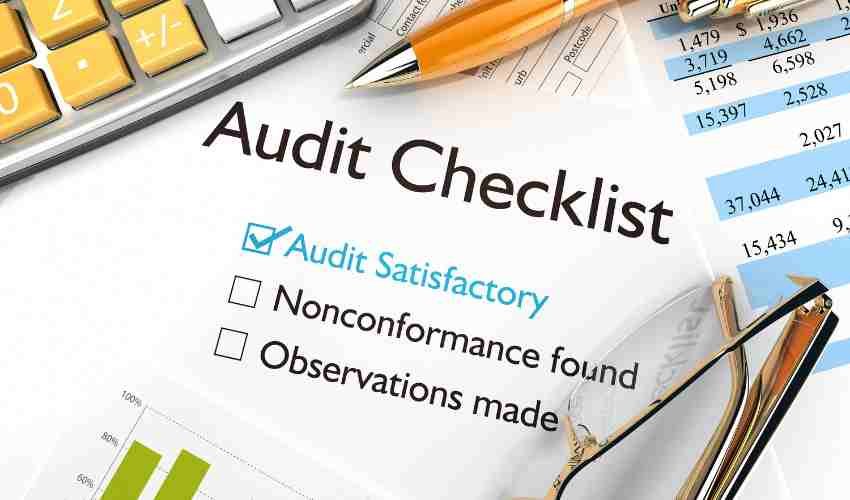
BLOG

A Food Safety Audit
In today’s global food industry, ensuring food products’ safety, quality, and compliance is paramount. A food safety audit is an essential process that validates food safety management practices and assesses compliance with regulatory and industry standards. With the increasing demand for transparency, food auditors play a vital role in safeguarding consumer health and building trust in brands across the food supply chain.
What Is a Food Safety Audit?
A food safety audit is a systematic inspection process carried out by a certified food safety auditor to evaluate a food business’s safety protocols and practices. These audits ensure that food establishments—from processing facilities and packaging plants to retail and service sectors—comply with legal and regulatory standards to protect public health.
Businesses can perform food audits internally or externally, where external audits are generally conducted by third-party professionals, like a GMP auditor or HACCP auditor, depending on the business’s specific needs. Such audits help companies meet Good Manufacturing Practices (GMP) and Hazard Analysis Critical Control Point (HACCP) requirements and facilitate compliance with global food standards.
Why Food Safety Audits Are Essential?
Food safety is a regulatory requirement and a critical component of quality control in any food-related business. Here’s why regular food safety audits are crucial:
Compliance with Regulations
Every country has specific food standards. In Canada, for instance, Canadian food safety training and food safety audit checklists are required for compliance. Regular audits help businesses stay current with regulations and avoid costly violations.
Risk Management:
Audits identify and address potential hazards within the production process, helping to prevent contamination, spoilage, and recalls.
Consumer Confidence
Meeting food standards builds consumer trust, vital for brand reputation and customer loyalty.
Continuous Improvement:
Audits provide businesses with insights into their safety processes, allowing them to refine practices and enhance efficiency over time.
Key Components of a Food Audits
Each food audits follows a structured approach, ensuring a thorough evaluation of practices and protocols. Here’s a look at the essential components:
Audit Preparation:
Before the audit, companies usually have a food audits checklist outlining key focus areas. This checklist ensures auditors can evaluate every critical aspect, from ingredient sourcing to food storage.
Documentation Review
Food auditors check documentation, including HACCP plans, employee training records, and cleaning schedules, to verify that the business follows compliant practices.
On-Site Inspection
Auditors conduct on-site inspections, reviewing processes, checking equipment for compliance with hygienic design, and ensuring safety protocols are in place. Packaging, storage, and distribution are thoroughly assessed to meet safety standards.
Corrective Actions
Based on audit findings, businesses receive actionable feedback and may need to implement corrective actions to close any identified gaps in compliance.
Types of Food Audits
Different types of audits cater to various aspects of safe food. Here are some of the most common types conducted by a food safety auditing service:
GMP Audits
A GMP auditor ensures that a facility adheres to Good Manufacturing Practices—standards covering hygiene, equipment, and production processes. GMP audits assess practices to reduce contamination risks and ensure the safe handling, processing, and storage of food products.
HACCP Audits
A HACCP auditor evaluates Hazard Analysis Critical Control Points in food production, identifying potential hazards and preventive measures. HACCP audits are critical for high-risk food products, helping businesses prevent contamination and ensure consumer safety.
Supplier Audits
A supplier audit assesses vendors’ safety and quality practices, ensuring that raw materials and ingredients meet the required standards. This type of audit helps businesses verify that their suppliers comply with safety guidelines, reducing potential risks in the supply chain.
Certification Audits
Certification audits ensure compliance with international food standards, such as BRCGS, SQF, FSSC 22000, and IFS. For example, an SQF consultant or GFSI consultant might conduct these audits to support businesses seeking global recognition for their commitment to safety.
Food Safety Auditing Courses and Training
The growing need for food expertise has led to the availability of specialized food safety auditing training programs. These courses provide comprehensive instruction in audit techniques and compliance standards, empowering industry professionals to conduct effective internal audits. Options include:
Food Safety Auditor Course
This course teaches the basics of conducting audits, covering audit planning, execution, and reporting.
Food Auditing Courses
These courses focus on specialized audits, such as GMP, HACCP, and supplier audits, and help participants understand and implement best practices in food safety.
Food Safety Auditing Training
Designed for employees responsible for safety within food facilities, these training sessions cover essential audit preparation and compliance checks.
How Food Safety Auditing Benefits Businesses
Implementing regular food audits offers several benefits that extend beyond compliance:
- Enhanced Safety and Quality: Audits help maintain high standards by identifying gaps in safety processes, resulting in safer and higher-quality products.
- Reduction of Financial Risk: Avoiding foodborne illness outbreaks and recalls prevents significant financial losses and legal complications.
- Improved Operational Efficiency: Audits provide insights that can streamline processes, reducing waste and enhancing productivity.
- Market Competitiveness: Certification from recognized food standards such as SQF, BRC, or FSSC 22000 can set a business apart in the global market.
Choosing a Food Safety Auditor
When selecting a food safety auditor or audit service, businesses should look for the following qualities:
- Experience and Certification: Ensure the auditor holds certifications and has experience with relevant standards, such as HACCP, GMP, and GFSI guidelines.
- Comprehensive Auditing Approach: The auditor should be thorough and cover all areas of safe food, from supplier audits to internal process checks.
- Reputation and Client Success: Look for auditors with a strong reputation and positive client feedback.
Arnika’s Food Safety Auditing Services
Arnika offers a full suite of food safety auditing services to support compliance at every stage of the supply chain. From organicand specialty foods to commercial food equipment and retail food audits, Arnika provides expert audit support tailored to each sector’s unique needs.
With Arnika’s food safety auditing services, you benefit from our team’s in-depth expertise in BRCGS, SQF, FSSC 22000, and GMP standards. Our audits are meticulously conducted, helping businesses reduce risks, ensure compliance, and gain consumer confidence. Whether you need help with food packaging audits, food storage inspections, or GMP audits for manufacturing facilities, Arnika has you covered.
Final Thoughts
For businesses in the food industry, ensuring safety and compliance through food safety audits is essential. Companies can protect public health, build consumer trust, and achieve long-term success with the right food auditing course and an expert audit partner like Arnika.
Choose Arnika for your food safety auditing needs and experience peace of mind from comprehensive, reliable support across all stages of the food production process.

Food Safety Audit FAQs
What is a food safety audit checklist?
A food safety audit checklist is a comprehensive guide listing all necessary areas for review, from hygiene practices to documentation, to ensure thorough evaluations.
Who should conduct a food audits?
Certified professionals like GMP or HACCP auditors typically conduct audits to ensure the business meets industry standards.
How often should food audits be conducted?
Annual audits are recommended, though high-risk businesses might benefit from more frequent audits.
What training is required for food safety auditors?
Many auditors complete a food safety auditor course and food auditing courses to ensure they have the skills needed for effective evaluations.
Why is supplier auditing important?
Supplier audits help verify that all raw materials meet safety standards, reducing potential risks in the supply chain.
